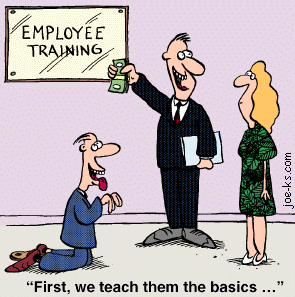The modern world is all about backup, contingency plans, and loss prevention. Without a backup (or parallel) income source you're basically at the mercy of your employer's unpredictable personnel decisions. It's one thing to be in the rat race, but entirely different to be a rat hanging on by a thread!
Yet you seem to believe that you can take on all the transactions of life with only one source of income. I guess your motto is,
"one job, one employer". And that motto would be fine if you had a contract to support it. But since you probably don't, I believe you need to start planning for ways to
minimize your risks of unexpected unemployment. In most of the developed world, the average employee lives beyond his means by debt-financing the lifestyle s/he desires to have. When there are shocks to the financial system followed by the inevitable disruptions in household incomes, the average employee who only has a single source of income will be the one to suffer the most. I continue to be amazed at how the average employee wades through life without any type of strategic safety net for their professional livelihood. Maybe being a trapeze artist isn't so risky after all.
Unless your strategy for sudden job loss is to have a fire-sale of all your household goods (and home if you're a buyer) and move back in with your parents, relatives, or friends; then I suggest you develop a sound contingency plan. If you want to escape the eventual fate of the masses without employment contracts, then
you have three options:
- Play the corporate game and get to the executive levels as quickly as possible.
- Stay at your same employee level and get a side job.
- Become a freelancer or consultant and get paid by the hour or by deliverable.
You will choose the option that best fits you depending on your personality, values, and abilities. However, there are other things to take into consideration like your civil status - legally recognized or not. Whether you are single, married, or in a domestic partnership (roommates or more); there are
four strategies you can use to ensure a minimal disruption to your lifestyle in the event of a disruption to your single source of income.
- One Single-Source Income Earner needs to find a second source of income. Say goodbye to your couch potato lifestyle and get a second job or create income from your hobbies. Whatever you decide to do, you'd better do it quickly. Be sure not to give in to the temptation of spending your extra money instead of saving it.
- Two Single-Source Income Earners need to become domestic partners or married. Two incomes are better than one and provide an in-house backup to one person's temporary income disruption. If one of you becomes unemployed, just be careful not to take too long in landing a new job because you were probably both living beyond your means. Nobody wants to pay your bills forever!
- Two Married (or Domestic Partners) Single-Source Income Earners need to have one spouse with a second source of income. Somebody has to have a normal day, so whoever draws the short stick can plan on working an extra 15-20 hours a week at the side gig. This scenario provides you the ability to save the vaunted "rainy day fund". The downside is that if your side gig is crap, you'll be more stressed out than the extra security is worth. So earn money from something you really enjoy!
- Two Married Single-Source Income Earners need to have both spouses with a second source of income. This is the maximum protection you can provide for yourself - though it comes at a high price due to the time you and your spouse have to spend working. Mitigate this by ensuring that both you and your partner take alternating breaks from your side gigs. Even though you'll have extra work on top of your primary job, it's far better to be a little stressed than unemployed without a backup. The peace of mind you'll have will more than compensate for missing your television shows now and then.

If all of this is just too much for you to stomach, then consider the risks of inaction. At the very least you should pay for short-term and long-term disability insurance through your employer's benefits package (assuming your employer offers that!). While it's convenient to only think of losing your source of income, it is more important to protect your ability to earn any income at all. It won't matter if you have a second source of income if your ability to work becomes impaired due to a debilitating illness or accident.
Doing nothing is
NOT a solution. Ignoring the problem is
NOT a solution. Hoping to keep your single source of income is
NOT a solution. Companies diversify their product and service offerings for a reason - to mitigate risks and maximize opportunities. How many grocery stores have you seen that only sale one item? Don't pay the high cost for being a well-trained, obedient employee who blindly relies on the patronage of his employer.
I highly doubt that your employer was founded with the sole purpose of providing you with long-term employment.


















